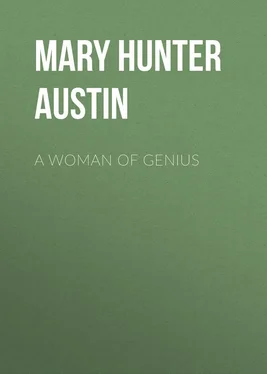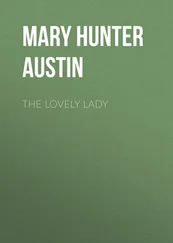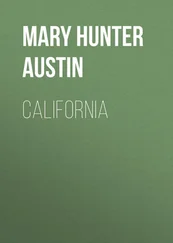Mary Austin - A Woman of Genius
Здесь есть возможность читать онлайн «Mary Austin - A Woman of Genius» — ознакомительный отрывок электронной книги совершенно бесплатно, а после прочтения отрывка купить полную версию. В некоторых случаях можно слушать аудио, скачать через торрент в формате fb2 и присутствует краткое содержание. Жанр: foreign_antique, foreign_prose, на английском языке. Описание произведения, (предисловие) а так же отзывы посетителей доступны на портале библиотеки ЛибКат.
- Название:A Woman of Genius
- Автор:
- Жанр:
- Год:неизвестен
- ISBN:нет данных
- Рейтинг книги:4 / 5. Голосов: 1
-
Избранное:Добавить в избранное
- Отзывы:
-
Ваша оценка:
- 80
- 1
- 2
- 3
- 4
- 5
A Woman of Genius: краткое содержание, описание и аннотация
Предлагаем к чтению аннотацию, описание, краткое содержание или предисловие (зависит от того, что написал сам автор книги «A Woman of Genius»). Если вы не нашли необходимую информацию о книге — напишите в комментариях, мы постараемся отыскать её.
A Woman of Genius — читать онлайн ознакомительный отрывок
Ниже представлен текст книги, разбитый по страницам. Система сохранения места последней прочитанной страницы, позволяет с удобством читать онлайн бесплатно книгу «A Woman of Genius», без необходимости каждый раз заново искать на чём Вы остановились. Поставьте закладку, и сможете в любой момент перейти на страницу, на которой закончили чтение.
Интервал:
Закладка:
Among the other things which a girl was expected to "pick up," along with the art of attracting a husband, was the vital information with which she was expected to meet the occasion of marrying one. It was all a part of the general assumption of the truth as something not suitable for the young to know, that nobody told us any of these things if they could help it. I do not mean to say that there was not a certain amount of half information whispered about among the girls, who by the avidity for such whisperings established themselves as not quite nice. But Pauline Allingham and I were nice girls. What this meant was that nothing that pertained to the mystery of marriage reached us through all the suppression and evasions of the social conspiracy, except the obviousness of maternity. I remember how intimations of it as part of our legitimate experience, began to grow upon us with a profound and tender curiosity toward very young children, and, particularly on Pauline's part, a great shyness of being seen in their company. But we were not expected to possess ourselves of accurate information until we were already involved in it.
We had reached the age when matrons no longer avoided references to its most conspicuous phases in our presence, before we found words for mentioning it to one another. There was a young aunt of Pauline's lent something to that.
She was a sister of Mr. Allingham, come to stay with them while her husband was absent somewhere in the West. Pauline told me about it one of the week-ends she spent at home from Montecito; this was Saturday afternoon, and she had found the aunt in the house on her return the evening before.
"Do you know," she said, "it is very queer the way I feel about Aunt Alice – the way she is, you know. Mamma hadn't told me, and when I came into the sitting room and saw her, I thought I was going to cry; and it wasn't that I was sorry either … I'm awfully fond of her. I just felt it."
"Yes, I know," I admitted.
"Aunt Alice is so sensible," Pauline explained a few weeks later, "she talks to me a great deal; she's only a few years older than I am. She has shown me all her things for the baby. Mamma didn't think she ought … you know how mothers are. They're in the bureau drawer in the best room. I'll show them to you some time; Alice won't mind."
Alice didn't mind, it appeared, so it must have been shyness that led us to select the afternoon when the married women were away, and though I cannot forgive the conditions which led us so surreptitiously to touch the fringe of the great experience, I own still to some tenderness for the two girls with their heads together that bright hot afternoon, over the bureau drawer in Mrs. Allingham's best room. Pauline showed me a little sacque which she had crocheted.
"Mother thought I was too young, but Alice said I might."
"You must have liked to, awfully," I envied.
"That's one of the nice things about having children, I should think" – Pauline fingered a hemstitched slip – "you can make things for them."
"Which would you rather have, girls or boys?" I hazarded.
"Oh, girls; you can always dress them so prettily."
"But boys … they can do so many things when they grow up." I felt rather strongly on that point.
"Alice says" – Pauline folded the little frock – "that she's so glad to have it she doesn't care which it is." Something, perhaps an echo of my mother's experience, pricked in me.
"They aren't always as glad as that."
"I suppose not. Alice is having this one because she wants it."
We looked at one another. We would have liked to have spoken further, to have defined ourselves, despoiled ourselves of tenderness, nobilities, but around the whole subject lay the blank expanse of our ignorance. We locked the drawer again and went out and played croquet. And that was how we stood toward our normal destiny that summer when Pauline was wondering if Henry Mills meant to propose to her, and I was wondering how much longer I could keep Tommy Bettersworth from proposing to me.
I managed to stave it off until the end of September. On the twenty-second of that month there was a picnic at Willesden Lake. There were ten couples of us, and Flora Haines, who was wanted to count even with a young man who was to join us at the lake, a stranger to most of us, nephew to one of the wealthiest farmers in the township. We had always wished there might have been young people at the Garrett farm, and there was some talk of this nephew, who was to come on a visit, being adopted.
Some of our brothers had made his acquaintance, and Pauline, who had met him at Montecito, had warranted him as "interesting." I believe Flora Haines was invited to pair with him because every girl felt that Flora would be eminently safe to trust her own young man to in the event of Helmeth Garrett proving more worth while.
Henry Mills, who was reading law at the county seat of the adjoining county, had come over for the picnic and was expected to bring matters to a crisis with Pauline, and Forester had a day off to take Belle Endsleigh, who was at the point of pitying him because, though he had such an affectionate disposition, so long as his mother depended on him he couldn't think of marrying. We had no chaperone of course; several of the couples were engaged, and there were brothers; we wouldn't have to put up with the implication that we were not able to manage by ourselves.
It was the sort of day … soft Indian summer, painted woodlands, gossamer glinting high in the windless air … on which Forester found it necessary to hope brotherly that I should be able to get through it without being silly. By that he meant that the submerged Olivia, however interestingly she might read in a book, was highly incomprehensible and nearly always ridiculous to her contemporaries.
Willesden Lake was properly a drainage pond of four or five acres in extent, drawn like a bow about the contour of two hills; water-lilies grew at the head where a stream came in, and muskrats built at the lower end. The picnic ground was in the hollow between the two hills, by a spring, where the grass grew smooth like a lawn to the roots of oaks burning blood red from leaf to leaf. As it turned out, though we put off lunch for him for an hour, young Mr. Garrett did not come, and as the party sat about on the mossy hummocks in the quiet of repletion, I thought nothing could be so much worth while as to leave Tommy in care of Flora Haines and get away into the woods by myself. The soul of the weather had got into my soul and I felt I should discredit myself with Forester if I stayed. There was a little footpath that led down by a rill to the lake, and as I took it, there was scarcely a sound louder than the soft down-rustle of the painted leaves. There were two or three old boats, half water-logged, tied at the head of the lake, and one of these I found and paddled across to the opposite bank. I had not known there was a path there opening from the dewberry bushes that dipped along the border, but the spirit in my feet answered to its invitation. I followed it up the hill through the leaf drift that heaped whispering in the smoky wood. I spread out my arms as I went and began to move to the rhythm of chanted verse. Where the red and gold and russet banners brushed me I was touched delicately as with flame. I had on a very pretty dress that day, I remember, a thin organdy with a leaf pattern, made up over yellow sateen, and the consciousness of suitability worked happily on my mind. At the top of the hill I struck into an old wood road where it passed through a grove of young hickory, blazing yellow like a host. Here I went slowly and dropped the chanting to the measure of classic English verse; it was the only means of expression Taylorville had provided me. Scene after scene I went through happy and oblivious. I had been at it half an hour perhaps, moving forward with the natural impetus of the play, in the faint old wagon tracks, and had got as far as when I was startled by the clapping of hands, and looked up to see a young man sitting on the top of a rail fence that ran straight across the way, as though he might have stopped there to rest in the act of climbing over.
Читать дальшеИнтервал:
Закладка:
Похожие книги на «A Woman of Genius»
Представляем Вашему вниманию похожие книги на «A Woman of Genius» списком для выбора. Мы отобрали схожую по названию и смыслу литературу в надежде предоставить читателям больше вариантов отыскать новые, интересные, ещё непрочитанные произведения.
Обсуждение, отзывы о книге «A Woman of Genius» и просто собственные мнения читателей. Оставьте ваши комментарии, напишите, что Вы думаете о произведении, его смысле или главных героях. Укажите что конкретно понравилось, а что нет, и почему Вы так считаете.












